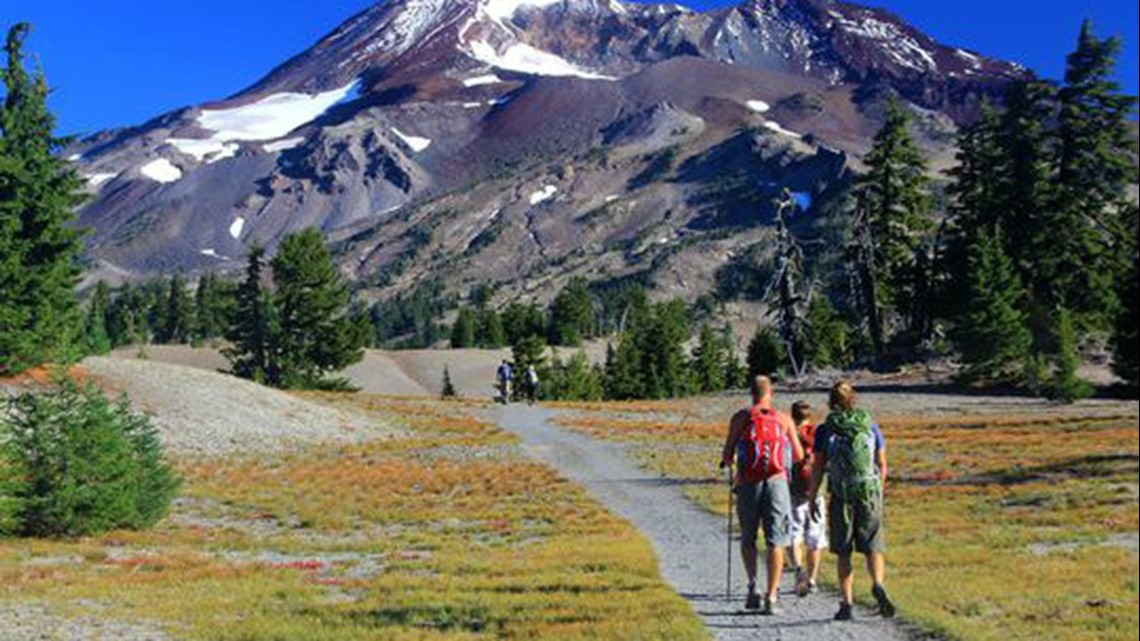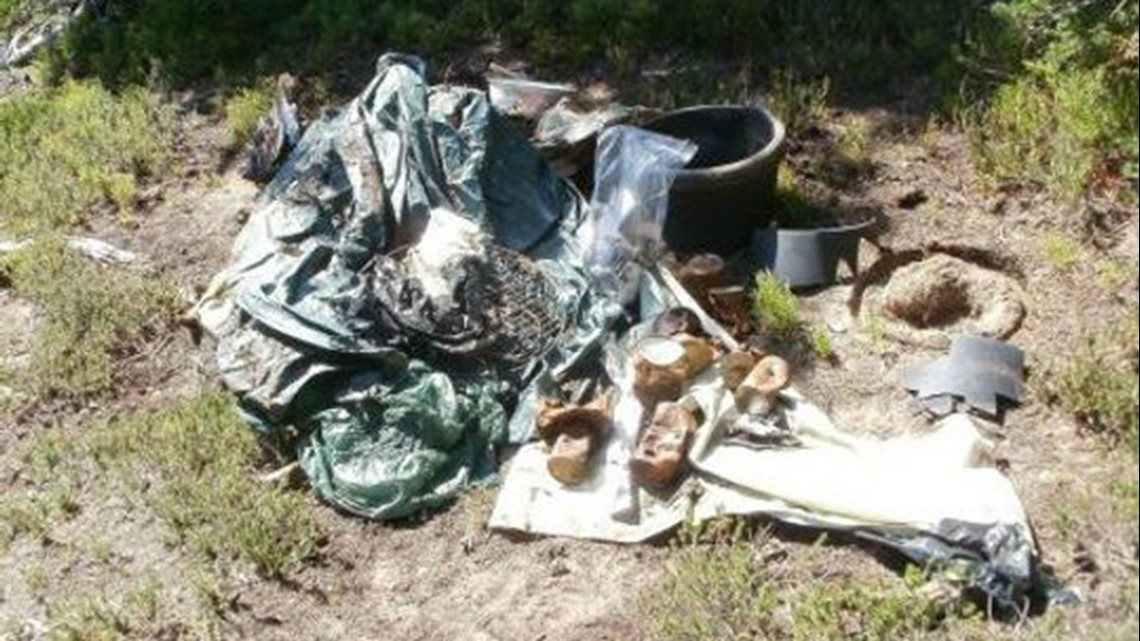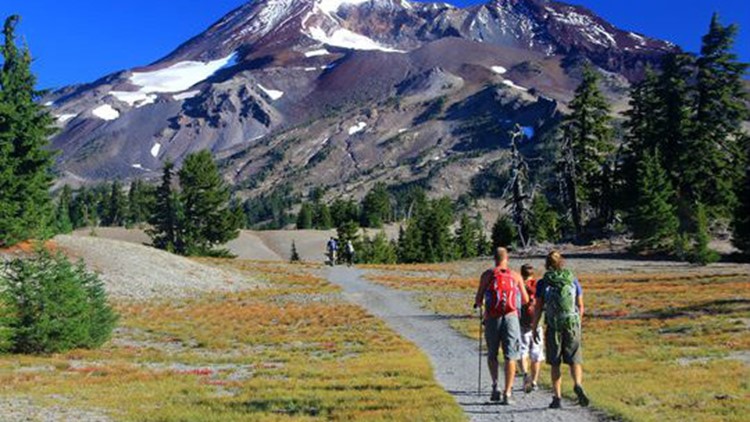Hiking and camping in three of Oregon's most popular wilderness areas will be restricted starting in 2020, an attempt by outdoor officials to limit damage from growing crowds of visitors.
The U.S. Forest Service announced a decision Thursday to install a permit system limiting the number of people in the Mount Jefferson, Three Sisters and Mount Washington Wilderness areas.
A sharp increase in crowds during the past decade — and environmental damage that’s followed — prompted the agency to enact sweeping changes to the way people access 450,000 acres of Oregon’s most iconic backcountry.
“The goal is to maintain the quality of our wilderness areas and the experience they offer,” said John Allen, supervisor of Deschutes National Forest. “It’s about keeping the amount of people to a level where they’re not degrading these special places.”
The newly-regulated areas sit between Salem and Bend on the Cascade Crest, a region of dramatic volcanoes, wildflower meadows and alpine lakes.
Anyone camping overnight in the three wilderness areas will need a permit from a limited pool, under the new system.
Day-users also will need a special permit for 30 of the most popular trails, including routes to Green Lakes Basin, Marion Lake, South Sister and Jefferson Park.
The decision marks a fundamental change to the unencumbered way most Oregonians currently hike, backpack and ride horses on public lands. It’s a system that treats hiking in a way similar to fishing or hunting, which have long been more regulated.
Officials say skyrocketing crowds — and the trash, damage and overflowing parking lots that have followed — left them little choice.
“We’ve tried just about everything,” said Matt Peterson, one of the project leaders. “Limited entry is the best tool we have left for protecting places that are getting way too much use.”
The public has 45 days to object before a final decision is reached in February. The new permit system would begin in 2020 and remain in effect each year between Memorial Day and Sept. 30.
How will it work?
Under the new system, each wilderness trailhead will have a quota of overnight and day-use permits for sale.
For example, at popular Marion Lake Trailhead, in the Mount Jefferson Wilderness, there will be 10 overnight group permits and 40 day-use permits available each day.
People can purchase permits online in advance, but a certain number will be held to allow for “spontaneous” same-day or next-day trips.
“The quota for each trailhead will be different,” Peterson said. “It depends on factors like how sensitive the area is to impacts, how popular it is historically, the number of campsites it has, and how much parking there is."
The cost of permits is being decided separately. The Forest Service will come to the public with cost proposals around February, Allen said.
Officials stressed the system isn't meant to limit overall numbers. It’s more about “redistributing” people to avoid massive crowds in just a few places, primarily west of Bend along Cascade Lakes Scenic Byway.
“For some of the most popular hikes, it will be tough to get a permit,” Peterson said. “But if a person can’t get a permit for a weekend in August, they might end up going on a weekday, or in the fall, or even trying a different area. It will redistribute use in a lot of different ways."


Why is this happening now?
The 1964 Wilderness Act defined wilderness as “an area where the earth and its community of life are untrammeled by man.”
But between Mount Jefferson and the Three Sisters, finding solitude in wilderness areas has been increasingly difficult.
The population boom in Bend and growth in the Willamette Valley have brought more people to the mountains each year, stressing the wilderness areas to the breaking point, officials said.
Visits have almost tripled in the Three Sisters since 2011. Mount Washington was up 119 percent and Mount Jefferson has also seen major increases.
All those extra people have had a profound impact on areas that are supposed to have little evidence of human influence.
In addition to issues such as crowded trailheads and limited campsites, wilderness rangers have found increased amounts of poop, garbage and trampled vegetation.
Rangers reported coming across unburied human feces more than 1,000 times in 2016. They reported hauling out more than 1,200 pounds of trash, according to documents.


"I don't even consider it a wilderness experience," said Chris Sabo, trail crew supervisor for Deschutes National Forest in a 2013 interview. "It's almost more of an urban park. The use is very high, really beyond what this area can accommodate."
Limited entry: already an Oregon idea
There are a handful of places across the West that use a limited entry system to control crowds at iconic destinations.
The summit climb up Mount St. Helens and backcountry of The Enchantments, both in Washington, have limited entry. It’s also in place at Mount Whitney and other places in California’s Sierra Nevada.
But perhaps the best example — and the example this system is based upon — can be found right here in Oregon.
Obsidian Trail (Three Sisters Wilderness) and Pamelia Lake (Mount Jefferson) have had limited entry since 1995.
Both places were becoming crowded and struggling with overuse in the early 1990s. But after the permit system, both have stabilized, seeing recovering forest, more wildlife and more solitude.
“I think we’ll see similar payoffs,” Allen said. “We have two decades of experience in seeing how this system makes a positive difference."
But both Allen and Peterson said having limited entry on such a large scale — across three wilderness areas and 450,000 acres — is an idea without much precedent.
A limited entry system will be in effect at 79 different trailheads for overnight use and 30 for day use. That's going to require hiring new wilderness rangers and having a streamlined distribution system.
"There's a level of uncertainty because it hasn't been done before on this scale," Peterson said. "We know we're not going to get it perfect, which is why we'll be able to make adjustments as we go. If something's not working, we can change it."
Campfire ban, PCT hikers, hunting exemptions
In addition to the permit system, officials made a few other changes.
- All campfires will be banned above 5,700 feet in the three wilderness areas.
- The trailhead for Broken Top will be pulled back to Road 370, tacking on an extra 1.3 miles of hiking.
- Hunters with a High Cascade deer rifle season hunting tag will be exempt from the permit requirement. The tag is already a "limited draw" and usually takes place in September.
- Thru-hikers traveling more than 500 miles on the Pacific Crest Trail will be allowed to camp in PCT corridor — within a quarter mile of the trail. However, PCT hikers will be prohibited from camping in a few areas, including Jefferson Park and Obsidian Limited Entry Area.
- A "Skyline Permit" will be offered to allow camping and hiking to Oregon PCT hikers traveling through the three permit-controlled wilderness areas.
Quota system breakdown
The number of overnight and day-use permits available to enter each trailhead in the Mount Jefferson, Three Sisters and Mount Washington wilderness areas will vary depending on location.
Here's a breakdown of each trailhead and the number of permits available for each from Memorial Day to Sept. 30 each year beginning in 2020.
Note: An overnight group permit can include up to 12 people on one permit. Individual day-use permits mean one person per permit.
Three Sisters Trailhead quotas available each day
Scott Trailhead: 13 overnight group permits / 12 day use individual permits
Obsidian: 13 overnight / 30 day use
Linton Lake: 2 overnight / 24 day use
Proxy Falls: No permit required. This trailhead will be targeted as an area to facilitate wilderness education
Foley: 7 overnight / no permit required for day use
Separation: 3 overnight / no permit required for day use
Rainbow: 3 overnight / no permit required for day use
Horse Creek: 3 overnight / no permit required for day use
Upper French Pete/Pat Saddle: 3 overnight / no permit required for day use
Upper Lowder: 3 overnight / no permit required for day use
Upper East Fork: 3 overnight / no permit required for day use
Lower East Fork: 3 overnight / no permit required for day use
Lower Lowder: 3 overnight / no permit required for day use
French Pete: 3 overnight / no permit required for day use
Rebel: 5 overnight / no permit required for day use
Olallie: 5 overnight / no permit required for day use
Elk Fork: 5 overnight / no permit required for day use
South Fork: 5 overnight / no permit required for day use
Crossing Way: 7 overnight / no permit required for day use
Box Canyon: 7 overnight / no permit required for day use
Skookum: 5 overnight / no permit required for day use
Taylor Burn: 6 overnight / no permit required for day use
Helen Lake: 6 overnight / no permit required for day use
Jack Pine: 6 overnight / no permit required for day use
Irish Taylor: 3 overnight / no permit required for day use
Many Lakes: 3 overnight / no permit required for day use
Deep Lake: 3 overnight / no permit required for day use
Winopee/Corral Lake: 3 overnight / no permit required for day use
Corral Swamp: 3 overnight / no permit required for day use
Lucky Lake: 3 overnight / 30 day use
Six Lakes: 8 overnight / 60 day use
Elk Lake: 4 overnight / 24 day use
Quinn Meadow: 4 overnight / no permit required for day use
Sisters Mirror: 4 overnight / 16 day use
Devils Lake/Wickiup (South Sister climbers TH): 16 overnight / 100 day use
Green Lakes / Soda Creek: 14 overnight / 80 day use
Todd Lake: 3 overnight / 12 day use
Crater Ditch: 4 overnight / 16 day use
Broken Top: 4 overnight / 40 day use
Tam McArthur Rim: 5 overnight / 80 day use
Three Creek Meadow: 3 overnight / no permit required for day use
Park Meadow: 3 overnight / no permit required for day use
Chush Falls: 3 overnight / 20 day use
Pole Creek: 3 overnight / no permit required for day use
Scott Pass: 4 overnight / no permit required for day use
Millican: 4 overnight / no permit required for day use
Black Crater: 4 overnight / 24 day use
Lava Camp: 7 overnight / 40 day use
Mount Jefferson Wildererness Trailhead quotas
Roaring Creek: 4 overnight / no permit required for day use
Crown Lake: 4 overnight / no permit required for day use
PCT Breitenbush: 4 overnight / 14 day use
S. Breitenbush: 5 overnight / 12 day use
Triangulation: 5 overnight / 16 day use
Cheat Creek: 5 overnight / no permit required for day use
Whitewater: 8 overnight / 30 day use
Woodpecker: 3 overnight / 12 day use
Pamelia Lake: 11 overnight / 24 day use
Minto Mountain: 4 overnight / no permit required for day use
Bingham Ridge: 4 overnight / no permit required for day use
Marion Lake: 10 overnight / 40 day use
Jefferson Lake: 3 overnight / no permit required for day use
Pine Ridge: 3 overnight / no permit required for day use
Big Meadows Horse Camp: 13 overnight / no permit required for day use
Duffy Lake: 13 overnight, 30 day use
Maxwell Butte: 13 overnight / no permit required for day use
Cabot Lake: 5 overnight / 14 day use
Bear Valley: 3 overnight / no permit required for day use
PCT Santiam: 10 overnight / 50 day use
Jack Lake: 5 overnight / 60 day use
Round Lake: 3 overnight / no permit required for day use
Mount Washington Wilderness trailhead quotas
Patjens: 3 overnight / no permit required for day use
PCT Big Lake: 2 overnight / 20 day use
Hortense Lake - Access Point: 3 overnight / no permit required for day use
Dry Creek - Access Point: 3 overnight / no permit required for day use
PCT McKenzie Pass: 6 overnight / 24 day use
Hand Lake: 3 overnight / no permit required for day use
Benson/Tenas: 8 overnight / 30 day use
Fingerboard Prairie: 3 overnight / no permit required for day use
Tenas Lakes: 3 overnight / no permit required for day use
Robinson Lake: 3 overnight / no permit required for day use
Skyline - Pacific Crest Trail permit
Daily launches: 3 overnight / N/A


